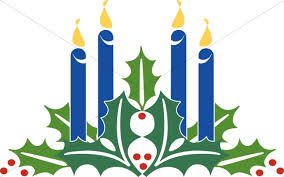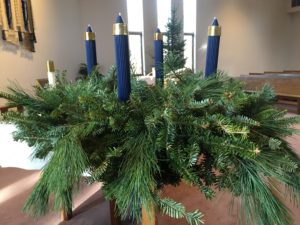In the case of inclement weather, it is the policy at Good Shepherd to cancel very rarely. Worship services will be held and members are advised to consider their own safety before venturing out. If needed, cancelation notices will be sent to members via email, posted on the website, Facebook and Google+ and sent to local media.
Devotion for the Third Sunday in Advent, December 11
The ELCA has created a series of four Advent devotions entitled “Liberated by God’s Grace” for each of the four Sundays in Advent. Here is the link for the devotion for the Third Sunday, December 11.
Bishop Eaton notes that “churches shaped by the 16th century reformations—the Anglican Church of Canada, the Evangelical Lutheran Church in Canada, the Episcopal Church, and the Evangelical Lutheran Church in America all participate in a ministry of reconciliation.” Over fifteen years ago, these churches’ respective full communion agreements inaugurated new relationships. Bishop Eaton says, “We are committed to working together toward reconciliation—of the church, and of the deepest social ills that plague our world. It is our hope, together with you, to be signs of anticipation—of the “already, but not yet” of God’s realm of reconciliation, justice, and peace. In this spirit we have prepared a series of devotions for the season of Advent…”
Sermon for Sunday, December 4 – “God’s Spirit Is Upon You”
Sermon For December 4, 2016 – “God’s Spirit Is Upon You”
Second Sunday of Advent
December 4, 2016
Good Shepherd Lutheran Church
Decorah, Iowa
Rev. Amy Zalk Larson
Click here to read scripture passages for the day
Beloved of God, grace to you and peace in the name of Jesus. Amen.
John the Baptist’s words sound so harsh, and they are. They also give us reason to hope. God has come near to work radical change within each of us and in our world. Our first reading, from the book of the prophet Isaiah, offers a glimpse of what that change will look like. God will bring about a peaceable kingdom for all of creation. The wolf will live with the lamb; the leopard will lie down with the young goat. Little children will play with snakes. No one will hurt or destroy on God’s holy mountain. This is a glorious vision of God’s future. It can also feel so out of reach.
We long for a day when no one will hurt or destroy, yet the headlines give us little reason to think that will ever come. In a world with so many threats, it’s hard to imagine letting children roam freely, much less play with snakes. In Isaiah’s day, too, God’s people were longing for a better day. They placed high hopes in kings. They remembered a time of relative peace and justice under King David and his son King Solomon. Our Psalm today was written by Solomon, a king who had some major issues, but at least knew to pray that the he might rule with righteousness. By Isaiah’s time, those good days and good kings were long gone. The family that had produced those kings, the family of David’s father Jesse, now looked to be a dead stump.
Isaiah envisioned a day when a shoot would come out of that stump, when what had been cut off would again bear good fruit. A good king would arise from Jesse’s tree. The spirit of the Lord would rest on him: the spirit of wisdom and understanding, the spirit of counsel and might, the spirit of knowledge and the fear of the Lord.
Once that righteous king was in place, then God’s peaceable kingdom could become a reality. A wise ruler would create the conditions in which all could live together in harmony.
Christians now believe that Isaiah’s vision will be fulfilled in Jesus. We learn in the Gospels that the Spirit of God is upon Jesus, that in him God’s kingdom has come near. As we hear about God’s peaceable kingdom and similar visions during the season of Advent, we pray that Jesus will come again and make them a fully present reality. Yet, Christians have been waiting a long time for Jesus to come and bring in God’s kingdom. We can easily get discouraged and think nothing will ever change. But here’s the thing: Jesus isn’t the only one who’s been given the spirit of the Lord that Isaiah describes. It has been poured out upon the church and given to us in baptism.
John promised that Jesus would baptize with fire and the Holy Spirit. Now we are baptized into the fire of Jesus’ death and resurrection and baptized with the Holy Spirit. As we’re baptized, the words prayed over us come right from Isaiah’s vision. The baptismal prayer, prayed for centuries now, is that we would be sustained by the Holy Spirit: the spirit of wisdom and understanding, the spirit of counsel and might, the spirit of knowledge and the fear of the Lord.
When we’re confirmed, and affirm the promises made to us in baptism, the prayer is that this same spirit would be stirred up in us. The Spirit of the Lord, the Spirit Isaiah promised would rest upon a righteous king, now lives within us. We have been given the Spirit that Isaiah identified as essential in bringing about God’s kingdom.
This Spirit makes us wise and understanding beyond our own ability. It guides us and gives us courage, provides knowledge, and helps us to live with reverence and awe of God and all that God has made. This Spirit empowers us to live out King Solomon’s prayer – to defend the needy, help the poor and stand up to oppression. This Spirit makes us part of the body of Christ that works to bring in God’s kingdom now, even as we pray for it to come in all its fullness. We don’t have to wait for an earthly leader who will bring in the peaceable kingdom. Good leaders are important to God, but our future doesn’t depend on them. Our future depends upon Christ who has already made us part of his glorious future. The Spirit is upon us and we have what we need.
Of course, we all have issues too, just like King Solomon. Our sin chokes the growth the Spirit brings so that we don’t bear the fruit of the Spirit. Our lives get full of worthless chaff rather than good fruit and nourishing wheat. That’s why John the Baptist’s message is hopeful as well as harsh. In it, we’re reminded that Jesus works radical change within each of us as well as in the larger world. That is just what we need. We need Jesus to cut out and burn away all the dead wood of our lives. We need Jesus to separate the wheat from the chaff in our hearts and cleanse us of all that doesn’t nourish. And this is what Jesus does.
Jesus comes to us as his word is read and spoken – as we hear harsh and comforting words that show us our need to repent. He comes as we receive his body and blood to light a cleansing fire within us. He comes in strangers, in those who are hungry, naked, sick and imprisoned, and shows us that when we neglect his children in need, we also neglect him. Jesus comes in all these ways to convict and change us. It is harsh but hopeful to know that we have a Savior who doesn’t leave us to our own devices, but rather comes to us again and again to bring change. He also assures us that we have his Holy Spirit within us, we have the transforming fire of his love, we have all that we need.
With this Spirit, as part of Christ’s body, we are part of God’s promised future even now and we can join in bringing it into fullness.
Let us take a moment to pray. Amen.
This Week at Good Shepherd, December 5-11
Tuesday, December 6
4:00 p.m. – Mary Circle Meeting, Sharon Drew hosts
Wednesday, December 7
7:30 a.m. – Men’s Breakfast
5:30 p.m. – Advent Prayer Service
7:00 p.m. – Choir Rehearsal
7:45 p.m. – Band Rehearsal
Thursday, December 8
10:00 a.m. – Adult Bible Study with Pastor Amy
11:00 a.m. – Education Committee Meeting
Friday, December 9
10:00 a.m. – Stewardship Committee
2:00 p.m. – Worship and Music Committee
Sunday, December 11 – Third Sunday of Advent
8:45 a.m. – Choir Rehearsal
9:30 a.m. – Worship with Holy Communion
10:30 a.m. – Fellowship Hour
10:45 a.m. – Sunday School
Devotion for the Second Sunday in Advent, December 4
The ELCA has created a series of four Advent devotions entitled “Liberated by God’s Grace” for each of the four Sundays in Advent. Here is the link for the devotion for the Second Sunday, December 4.
Bishop Eaton notes that “churches shaped by the 16th century reformations—the Anglican Church of Canada, the Evangelical Lutheran Church in Canada, the Episcopal Church, and the Evangelical Lutheran Church in America all participate in a ministry of reconciliation.” Over fifteen years ago, these churches’ respective full communion agreements inaugurated new relationships. Bishop Eaton says, “We are committed to working together toward reconciliation—of the church, and of the deepest social ills that plague our world. It is our hope, together with you, to be signs of anticipation—of the “already, but not yet” of God’s realm of reconciliation, justice, and peace. In this spirit we have prepared a series of devotions for the season of Advent…”






